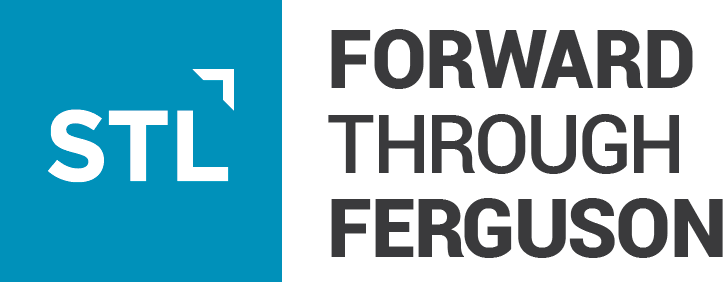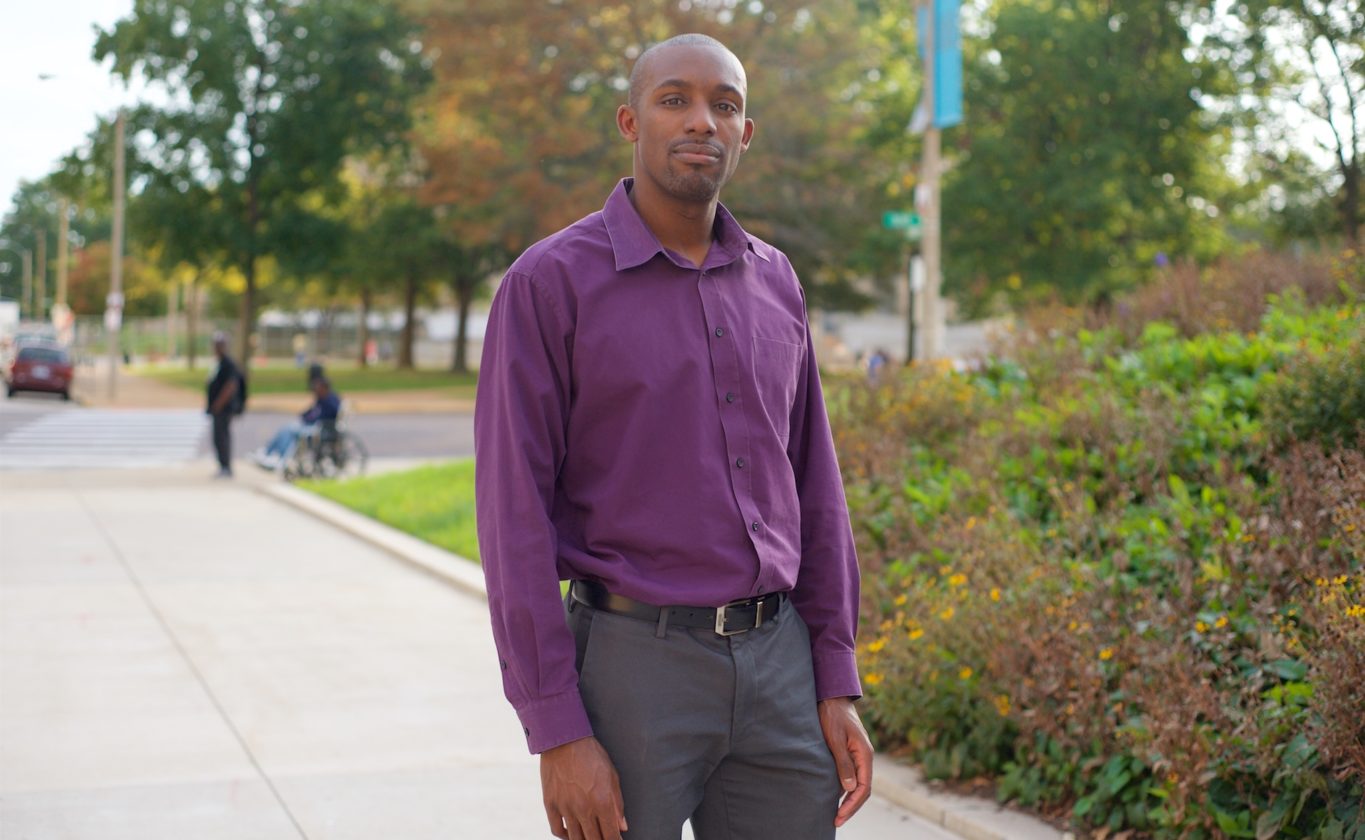I was in my last year of law school when Mike Brown was killed on August 9th. I had just left home on my way back to school. I was already looking at public interest opportunities and social and racial justice opportunities. It’s fair to say that before that happened, I probably was not coming back to St. Louis. I spent two summers in D.C., and was intending to go back there. But seeing that tragedy and what happened to the city and what was happening in the region really changed my thinking about where I wanted to be and what I could potentially do. It was actually a couple of months after that that a friend pointed me towards ArchCity Defenders. I saw an article in the Washington Post about the work ArchCity was doing and how they had been on this beat of local, municipal abuses before almost anyone else in the region. I reached out to Thomas Harvey, ArchCity’s Executive Director. What they were already doing and wanting to do dovetailed with my interests and some of my background. It all came together a little too perfectly. It’s not like I planned it that way. I just suddenly found myself coming upon this organization that seemed like exactly the right place, and it has been.
It’s hard to describe the work that we do. It’s really easier to understand it as anything that contributes to the criminalization of or state violence against poor communities and communities of color in this region.
I grew up in North County, St. Louis, and after about 10 years away, I returned as a Skadden Fellow. The fellowship funds legal services for poor communities all over the United States and places people out of law school into two-year positions. Now, I’m part of the civil rights litigation team at ArchCity Defenders. We have a number of different projects, but most of them focus on federal Section 1983 Litigation, which is just a legal term for constitutional claims against state actors, individual police officers, government employees, police departments, or municipalities. Among the issues that ArchCity seeks to address are debtors’ prisons, police misconduct issues, and some excessive force cases. It’s hard to describe the work that we do. It’s really easier to understand it as anything that contributes to the criminalization of or state violence against poor communities and communities of color in this region.
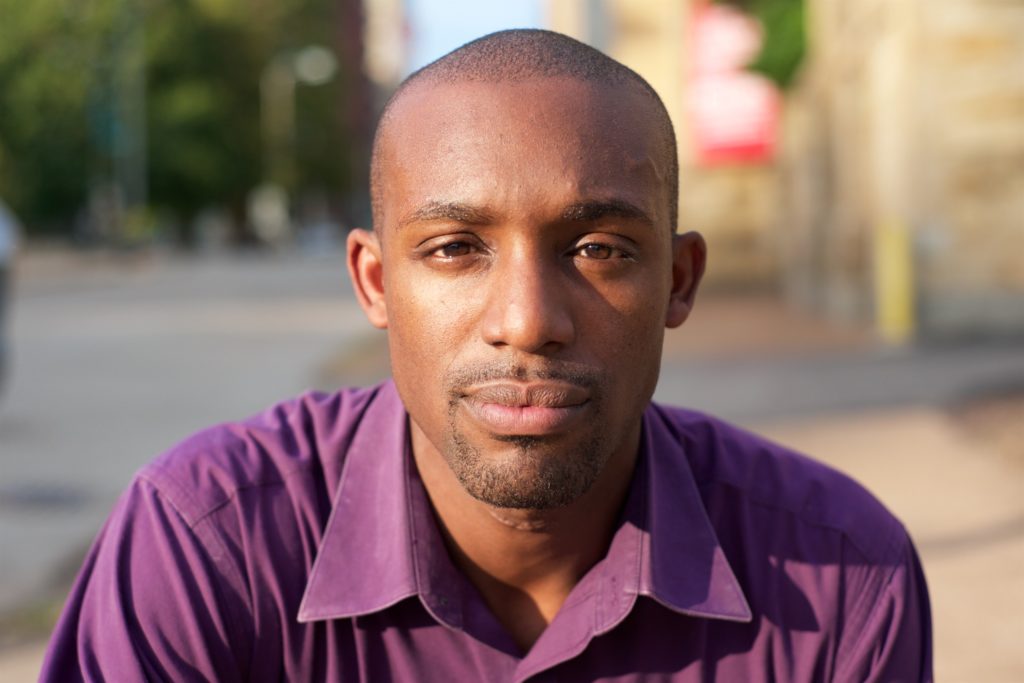
Blake Strode, photos by Lindy Drew
A lot of what we do centers around what most of us will consider, and what is rightly considered, really minor, low-level legal interactions. They don’t quite rise to the level of criminal infractions. It’s quasi-criminal. It’s traffic stuff. It’s the routine. It’s things that we all have some exposure to and experience with, yet, when we talk to our clients about how these mundane experiences have an impact in their lives, it’s absolutely devastating. You hear about these things, but sitting across from someone telling you how they’ve sat in a cell for days at a time because they couldn’t pay a traffic ticket, how they got sick, how they missed their family members’ funerals, how their families have been torn apart and some have lost custody of children in connection with these things – it has devastating impacts on people’s lives. We say in our office all the time, “Just when you think you’ve heard the worst thing, there’s the next thing.” The next person comes through the door and leaves you with your jaw on the floor feeling sad, outraged, and overwhelmed by how horrific their experience has been. You can’t help but walk away with a sense of the damage that the whole system is doing, not to any particular individual, but to whole communities.
It’s our clients that are targeted. They are disproportionately stopped, disproportionately arrested, disproportionately charged, and disproportionately sentenced every step along the way.
You take folks against whom all the odds are already stacked – it’s hard enough just to move through the world with little to no money, worrying about everything from feeding yourself and your family to keeping clothes on your back to keeping a roof over your head to having transportation around the city. Just those day-to-day challenges would be more than most people could bear. Instead of actually aiding people through that process, what much of the current legal system does is create another barrier. It makes all of those things exponentially more difficult. Some of what we do probably falls into the realm of social work, but at the end of the day, we’re mostly an office of lawyers. We are doing legal work, trying to address people’s legal problems, and time and time again what we find is that the legal system is just taking an already bad situation, making it worse, and doing so under the guise of law and order or equal application of the rules. And, really, it’s not at all an equal application of the rules, because it’s our clients that are targeted. They are disproportionately stopped, disproportionately arrested, disproportionately charged, and disproportionately sentenced every step along the way. It is hard not to get the sense that there’s a concerted effort to ruin these people’s lives. You can’t make any sense of it other than to say that the system has a life of its own and it has always operated to do that. So it continues to do that without real affirmative steps to the contrary.
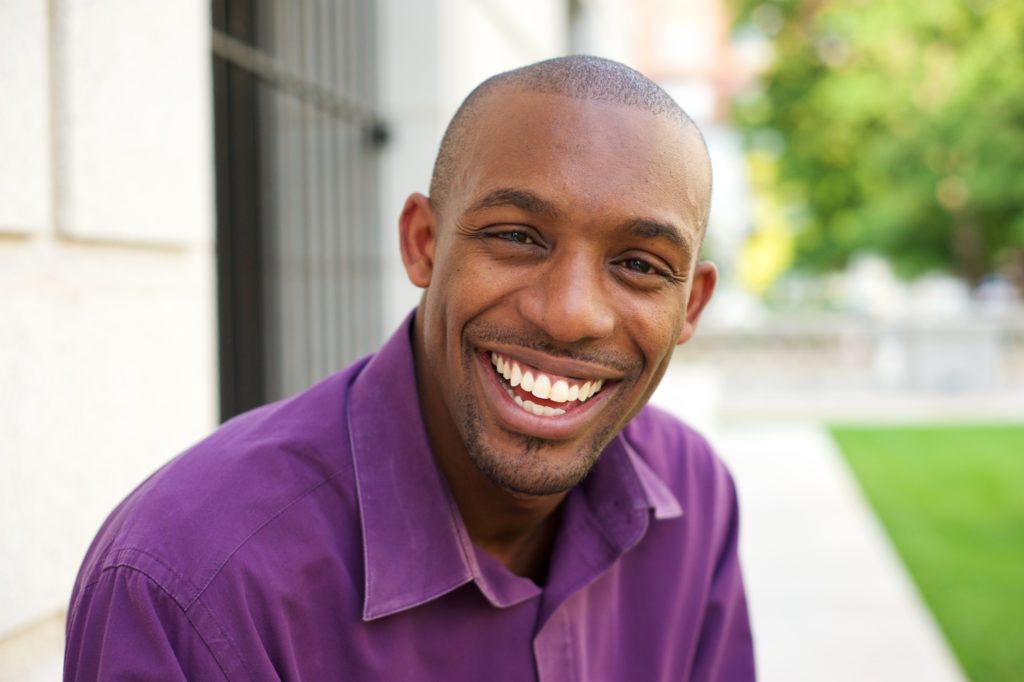
Law school prepares you for something, but it’s not really this. Law school, at least the one I went to, is very theoretical. Some are focused on experiential learning and clinical learning, but for the most part, you’re trained, oddly, to almost be a judge or a clerk more than to be a practicing attorney, and certainly not to be an attorney for indigent clients, which is a totally different experience. It’s a 180 from law school, which is not to say none of the skills you learn along the way are valuable. Of course, they are in certain respects, but in others, you’d be better suited with a social work, teaching, psychology background, or something where you’re dealing with people.
So much of what we do is understanding people and what makes them tick. What’s going to appeal to them? What’s not going to be effective? You don’t really cover any of that in law school. It’s all about being a legal doctor and having a supposedly very neutral, objective analysis of the law, which, of course, is fiction. To me, despite all the shaping that happens at law school, and the experiences, the internships, the jobs, and the professional development, what would enable or disable someone from doing this work would really have been formed before school. If it’s there, it’s likely not going to be stripped out of you during law school. And if it’s not there, law school’s not going to instill it in you.
I was always aware of inequality and injustice and preoccupied with the plight of vulnerable people. It’s like you can’t escape the injustice no matter how much pleasure there is to be had around you.
When I was growing up in St. Louis, attending schools throughout the city, or afterward when I was at the University of Arkansas, or playing professional tennis for a few years, I was always aware of inequality and injustice and preoccupied with the plight of vulnerable people. It’s like you can’t escape the injustice no matter how much pleasure there is to be had around you. Everyone I know who’s really committed to this work feels that way. No matter where you go in the world, like, you go to Paris and it’s magnificent and glorious, but then you look at a poor man sitting on the corner begging for change. You can’t appreciate the Eiffel Tower because you’re focused on the human suffering of this person. In the face of how our legal system operates, that’s what it takes to advocate for the most disempowered people every day. You know it when you see it, and you really can’t fake it.
If you start this work, and that’s not your general attitude and orientation about life, you probably won’t do it long, because it’s hard and you are faced with that high level of human suffering every day. We get paid fine, but you can make a lot more money doing other things. People who do it don’t actually conceive of it as a sacrifice. If you’ve gone to one of the elite schools people say, “Oh, you could be doing anything.” But, I would be miserable at a big corporate law firm. This work is in my nature. It’s what I did throughout law school. It’s what I did in college. It’s what I’ve been annoyingly talking people’s ears off about since I was in high school. My grandma loves it. Every time there’s anything in the paper about ArchCity, she’s cutting it out and passing it around to everybody at church.
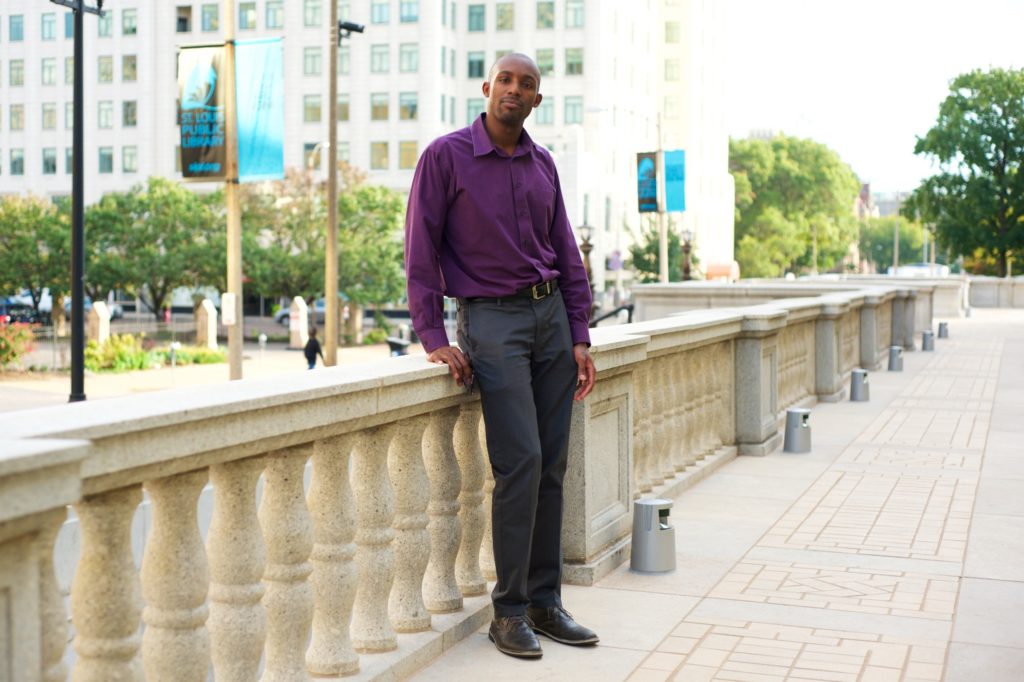
I’m particularly moved when I hear people telling their own stories in detail. I recently did an event at the Contemporary Art Museum on debtors’ prisons with a couple of our clients, including the lead plaintiff in the Ferguson debtors’ prison class action. I was there to moderate, to set up the issue and give some context. The others were telling about their experiences with local debtors’ prisons in St. Louis. I’ve heard their stories multiple times because we represent both of them. It was not my first time hearing any of the details that they shared. Yet, every single time you hear a mother being kept from her child for days at a time wondering what’s happening with her, not being able to find out because she’s sitting in a jail cell, or a woman missing her father’s funeral because they won’t let her out of jail due to unpaid tickets…
We were sitting in this room with about 100 people. All over again, I could feel myself getting sad, getting angry. I would look out at the people in the audience and they were crying and shaking their heads. You could see this quizzical look on their faces, like, “How could this be?” Just thinking about how badly these two women had been wronged, and how much work you have to do to convince people of the basic facts… If you’re sitting across from them and hearing their stories, it’s hard not to immediately be struck with the injustice of it all. Yet we know from experience that’s just not how it plays out with the powers that be in this region, and certainly not with a lot of the legal actors in this region who think that this is how our legal system should operate.
On its most basic level, Racial Equity, to me, means that you cannot accurately predict anything about an individual based on their race.
On its most basic level, Racial Equity, to me, means that you cannot accurately predict anything about an individual based on their race. You wouldn’t be able to predict what zip code they live in, what kind of education they got, what income they make, or whether they’re more or less likely to be targeted by law enforcement, followed in a store, or discriminated against when they seek housing. Of course, at present, we can predict the likelihood of all of those things based on race. The notion of Racial Equity means that race is no longer a factor in any of those, or any other daily interactions or lived experiences, which is not at all the same as saying there is color blindness. Part of what we strive for, part of the idea of American exceptionalism, is this idea of a melting pot, of many cultures and races coming together having differences. I think we can embrace differences without making it a proxy for power or privilege as we currently do. It’s such a theoretical idea at this point that you could project onto the term anything that you want because it doesn’t have a concrete reality in our world. But if we would move closer to that, we would be a lot better off.
Marginalized communities are typically targeted and the marginalized communities in this region are overwhelmingly Black communities.
Marginalized communities are typically targeted and the marginalized communities in this region are overwhelmingly Black communities. It’s really important to always say that and acknowledge it. The more we put that element at the forefront of our work, the better the outcomes are because presenting something this way also forces people to wrestle with it. It’s important to discuss that marginalized communities are this way because it’s not how we’re taught at all. It’s not just that it’s skipped over. We’re taught the opposite.
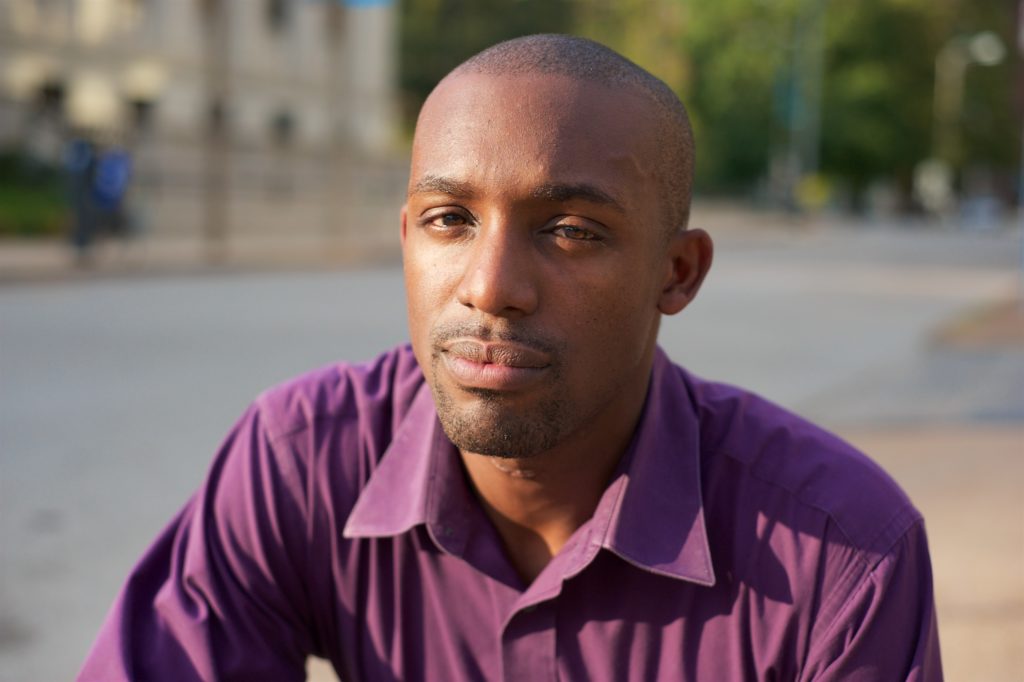
We’re taught that if you throw in an incendiary allegation that race is playing some role, it could hamper your claim. It could make the legal analysis more difficult. Just on the most basic level, it’s plainly obvious that race is playing a role. It’s dishonest not to think so, especially coming from this region and knowing what we went through for the past couple of years and how much work has been done by those who are stepping forward to do the work.
Victories aren’t frequent enough in this work.
Our work centers around municipal courts. It goes beyond that also, but a lot of it centers on the practices and policies of the municipal courts, which have been so abusive for so long. So, one of our major litigation strategies at the moment is challenging the practice of debtors’ prisons in this region, which basically just means being held in jail because of an inability to pay some underlying fine to a city usually stemming from traffic or some other municipal ordinance violation. We’ve brought about five class actions challenging Jennings, Ferguson, Velda City, St. Ann, and just recently filed a 13 city conspiracy claim with St. Ann as the hub and the jailing center for all of these towns in North County, challenging all of their municipal court and jailing practices.
We’ve already seen some promising results, the best being in Jennings where we settled and got what’s called injunctive and declaratory relief very early on. That means that the city agreed to change a whole host of policies around cash bail, jailing, and the issuance of warrants and arrests. We also settled the damages claim, which means that people are actually going to get paid some money. The policies are one thing, but we have people that have suffered real harm and they deserve to be compensated for that. This is the best in terms of compensation that we’ve had in any of our cases. We’ve seen a $4.75 million settlement for a total settlement class of about 2000, although people have to make claims. Now we’re in this process of getting the word out, making sure people know that if you were held in Jennings on a failure to pay, send in a claim form and make sure you get your cut of this settlement. In some ways, it’s a real victory. Victories aren’t frequent enough in this work.
This really was a message to many of the other municipalities and the legal establishment, as well as for our clients and for the eight plaintiffs who signed on to that suit early on to say, “Yeah, we want to challenge this. We want to assert our constitutional rights. We want to tell the world that what happened to us was wrong.” And now here we are with this settlement, almost $5 million, to pay these folks, and the city is adopting changes. That’s a really big deal for us and especially for our clients and it’s encouraging, too. That happened before we even filed this suit against 13 towns to say, “This isn’t just in Ferguson. It wasn’t just in Jennings. This is a regional problem, and we want to address it everywhere.”
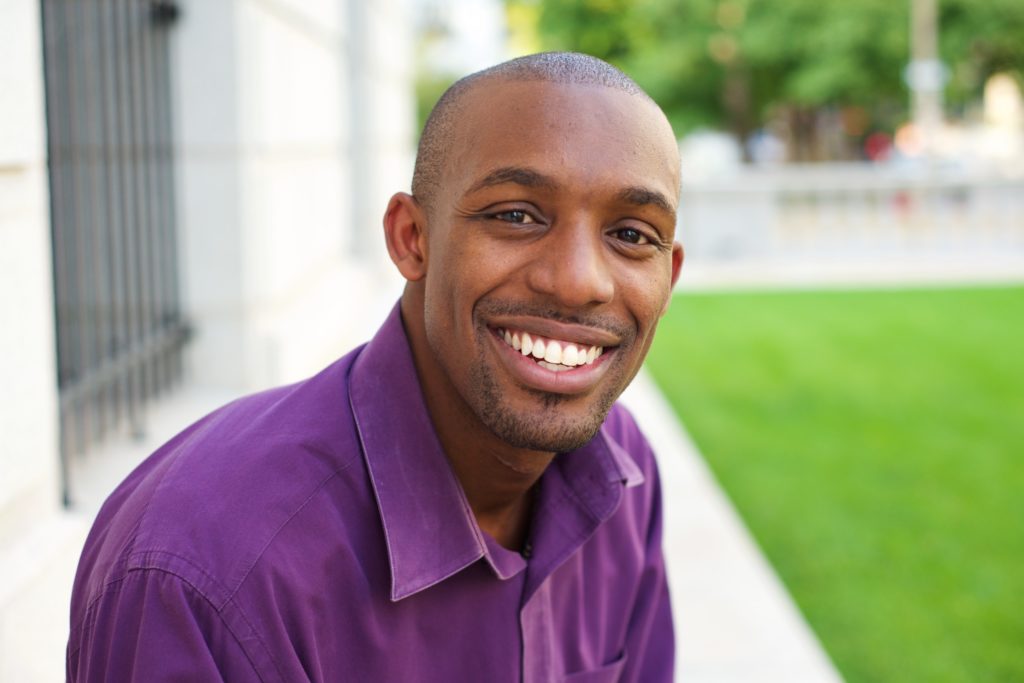
Outside of the legal role, our partnerships with organizers and activists in the area are really important to us and have enabled us to do far more than we could do on our own. One thing that has been illuminating was getting involved in the St. Louis circuit attorney race, and working with groups like Missourians Organizing for Reform and Empowerment, Organization for Black Struggle, and other young organizers. I co-moderated this debate with Kayla Reed, now with St. Louis Action Council, in which we shined a spotlight on issues that affect their members, our clients. Out of the blue, someone said, “Well you’re a lawyer and you understand the legal aspect. You should co-moderate.” I was like, “All right.” I can’t imagine that happening if I were working anywhere else and we did it. I genuinely believe we changed the complexion of the race in part because of how we engaged with the candidates and how we really elevated some issues that other debate hosts, forum hosts likely wouldn’t have done in a way that we were able to do.
I like talking about these things and about work. Talking about it makes you think about it, and a lot of times you just don’t have time to do that. It’s a luxury. There’s always the next thing to do. And when can you just sit back and think through what is actually happening, it’s kind of enjoyable. I feel really, really lucky. Of course, I’ve worked hard to be where I am and doing what I’m doing. I always took my academic pursuits very seriously, and all of that. Still, on some level, I feel like having the family support that I had, the parents that I have, and my life experiences… I would have had to really screw up to not have gained some access and privilege. The opposite is true for so many people, some of whom I grew up with, some of whom are in my family, some of whom are friends. I try not to take that for granted.
One of my favorite people in the world is Cornel West. I saw him speak a few times and I love everything he says and writes, like, “We are who we are because somebody loved us.” I believe that 100%. Anything I do that’s good, I take very little credit for it. Someone set me up to be able to do that. To me, that just carries with it the responsibility to try to be of service to someone else who perhaps hasn’t been as fortunate.
-Blake Strode, Skadden Fellow and staff attorney at ArchCity Defenders
